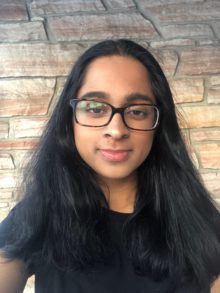BY: GAYATHRI GIRI, BAYVIEWGLEN SCHOOL
Like most students, before I participated in the Global Ideas Institute, I knew that plastic has a negative impact on the environment. However, this organization has opened my eyes to the realities of the situation and how even small amounts of incorrect plastic disposal can have major impacts. In addition to being unappealing, plastic releases many harmful chemicals into the soil which then can seep into groundwater and cause adverse effects on the species that drink the water. Furthermore, when the plastic is broken down into extremely small fragments, called micro-plastics, they can carry pathogenic organisms and act as a vector for illnesses. These micro-plastics drastically affect aquatic organisms. Many organisms, such as crustaceans and other filter feeders, mistake the micro-plastics for food and ingest it, resulting in death or other serious health issues. These harsh realities are a wakeup call and have shaped the way I see the world today.
Most importantly, the Global Ideas Institute taught me the small steps I can take to greatly reduce plastic pollution. For instance, I was shocked to learn that disposing of a peanut butter container without rinsing the left-over peanut butter in the container can contaminate an entire truckload of recyclable items, causing them to be sent to the landfill instead of being recycled. Annually, tons of recyclable material is destroyed due to contamination. Now, I make sure to always rinse containers and jars before placing them into the recycling and encourage my friends and family to do so as well. Even something as simple as bringing a reusable bag to the grocery store instead of using the store’s plastic one and buying items in bulk instead of separate serving cups can have a significant impact on lowering the amount of plastic pollution.
Through my research, I learned that many countries are trying to reuse plastic in many unique ways. For instance, a company called Ecobricks in the Philippines breaks plastics into 1 centimeter pieces and mixes them with sand and concrete to form bricks that are stronger and cheaper than their traditional counterparts. My team agreed that it would be difficult to completely eliminate the use of plastic because of its low costs and malleability. Additionally, many products are composed of different types of plastic, making them nearly impossible to recycle without separating the plastics, an expensive and time-consuming process. For instance, saran wrap consists of Polyethylene, LDPE, and HDPE, each of which needs to be recycled in its own way. Saran wrap is nearly impossible to recycle since it is composed of so many different types of plastics.
Inspired by Ecobricks, we researched ways to reuse existing plastic and transforming it into new products or strengthen existing ones. Moreover, the Global Ideas Institute has taught me how to look outside of the box and consider all crazy and unique solutions. Plastic pollution is a growing problem affecting all parts of the world and I am thrilled in being part of finding an effective solution.
